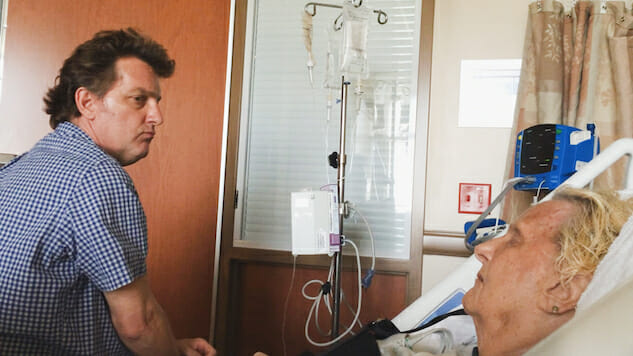HBO’s Medical Error Doc Bleed Out Is Brutal, Unmissable Viewing
Photo: Courtesy of HBO
Hi, Paste’s Something Rotten in Denmark (and by Denmark I Mean the U.S.) Correspondent here with a Disaster Documentary Bulletin. Are you concerned that you don’t have enough things to be disgusted by, frightened of or worried about? I’ve got your six! And so does HBO.
I’ve always said it: If you don’t want to die, avoid the hospital. There is this thing called “Iatrogenesis,” an ancient Greek word for “illness you got because you went to the doctor.” A long time has passed since Athens was the center of the intellectual universe, so you would think at some point in the last couple millennia we would have sophisticated ourselves out of the “hospital more likely to kill you than illness or injury” zone, but nah. We haven’t.
Enter Bleed Out, a raw and infuriating hour and a half documenting what happens to one man’s mother after she goes into the hospital for a hip replacement (a procedure we have honed to a pretty exact science, theoretically) and ends up brain damaged, incapacitated and suicidal. And broke. That last one’s significant, because the title isn’t just a reference to dying from blood loss. It’s also about a dirty system that lets you (indeed, depends on you) hemorrhaging money.
I will say at the outset that, artistically, this film is not a magnificent achievement. It doesn’t suck. But it’s scattered. It’s not searingly intelligent. It’s not cinematically groundbreaking. (It does have spy-pen footage, though!) It’s seriously middling on all artistic fronts. There, I said it. Sometimes that’s enough for me to gently suggest not burdening your queue with a documentary, but not in this case. This is something you urgently need to be aware of, because the odds that you will be affected by it at some time in your life are unfortunately huge. So buckle up.
Wisconsin-raised comedian Steve Burrows loves his mom, Judie, a globetrotting, independent-minded retired schoolteacher whose joints aren’t keeping up with her any more. So he’s obviously stressed out when he gets a call from his sister saying Judie has done that thing aging folks do, where you fall and end up with a hip fracture. (Or your hip fractures and that’s why you fall; they both happen: Yay, aging!). Judie goes into the hospital and has surgery to fix the joint. The surgeon is a trusted family friend. Everything seems fine, except she isn’t healing. That’s concerning, but it happens. Then she reinjures the hip. And all hell breaks loose.
-

-

-

-

-

-

-

-

-

-

-

-

-

-

-

-

-

-

-

-

-

-

-

-

-

-

-

-

-

-

-

-

-

-

-

-

-

-

-

-








































